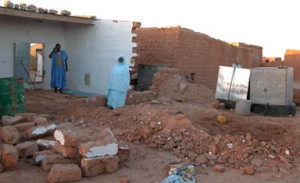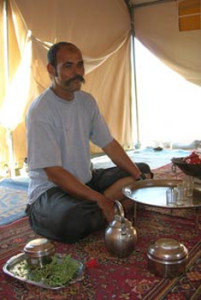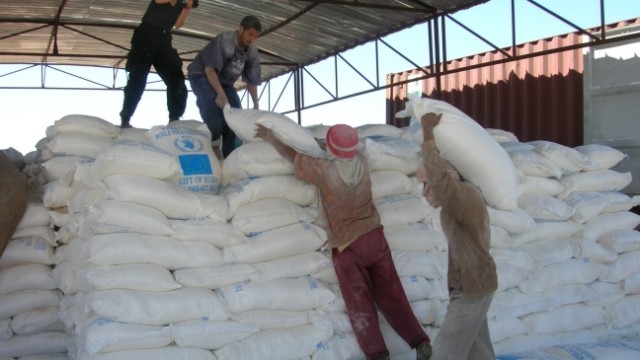Two months after the flooding, the damage is striking: people feed cardboard to their goats.
SMARA (TINDOUF) – ‘If they eat the cardboard, they no longer give milk but at least it keeps them alive and that’s all that counts’. Sitting in his new tent, Mohamed tears up some boxes to feed the three goats that have survived the floods. He has no feed for his animals, but the cardboard that fills their stomachs won’t kill them because the goats are used to it… even before the floods two months ago.

Photo : EC/ECHO/Daniela Cavini
I can’t explain how we got ourselves out. I know that I was the only man around and I had to save my family and neighbouring families too. Everyone was looking for me, there was a general panic and people were calling out to me from everywhere. I didn’t know how I could respond to everyone. I only knew that I was responsible, as our tradition demands’.
It’s thanks to his small van that Mohamed Salah Boudjmana (53) could save his family and neighbours from the worst flooding to hit this part of the Algerian desert, south-west of Tindouf, since the refugees arrived in 1975.
‘It rained solidly for three days – we had never been seen that before, it was unknown. In the desert, we have learnt to endure the wind and the sand. Even if we fear them, we know how to face them as we have always done. But against such rain…..what could we do?’
On the night of 11 February, the water level rose dangerously and a torrent of mud started to carry everything away. Mohamed put his reservations aside and took a decision. He needed to leave his home as soon as possible and find shelter. The Boudjmana family rushed to put the carpets into the van and placed food, saucepans and clothes on the highest shelves of the house. After that, they left.
‘I got my family with the other women and children into my small van. All squashed together. We headed with difficulty to a hill – the vehicle was sliding and skidding, I nearly lost control of it. We stayed there the whole night without shelter from the rain. On the top of the hill, we could see what had taken us 30 years to build being swept away in one night.’

Photo : EC/ECHO/Daniela Cavini
Mohamed returned to the village alone at dawn on 12 February to see what had happened. His house and three others nearby were no longer there. The walls had collapsed onto the food and clothes. The mud had taken everything. A lot of effort had been needed to convince people to give up their tents for brick houses in the first place. ‘When I saw the disaster, I thought that the tent would have been better – it would never have collapsed like that….as for me, I no longer have the desire or the means to start building a new house’.
Next to Mohamed, his wife Sennaha raises her head – she is very worried about the future. ‘I am the head of a women’s cooperative productinf barley and couscous for sale. How can we pay back the loan we received? How can we settle our debt? Everything was taken away by the water – we have nothing except for what we have been given. A new tent, blankets, some oil, some flour and some plastic tarpaulins’. She continues ‘there is a lot of solidarity between the families, we help each other and share resources. But even the richest among us cannot live without the solidarity of the international community. We are completely dependent on aid and even if some of us do have a small income, it is not enough.’
Two months after the flooding, the damage is striking – three of the four refugee camps have been completely devastated: half of the houses have been destroyed and most homes have been severely damaged. Market areas have practically disappeared, administrative buildings have suffered severe damage as have the community centres and clinics. Several schools are in such a bad state that they can only be re-opened after extensive repairs.
On 14 February the European Commission’s Humanitarian Aid department took a fast-track primary emergency decision allocating €900,000 to meet the most urgent needs. ECHO’s partners are in charge of distributing food, tents, blankets, mattresses and plastic tarpaulins. Further support is envisaged to help the victims of this natural catastrophe. It will be many months, or even years before the refugees living in this corner of the world can return to ‘normal’ life.
Daniela Cavini
ECHO Regional Information Officer – Amman

